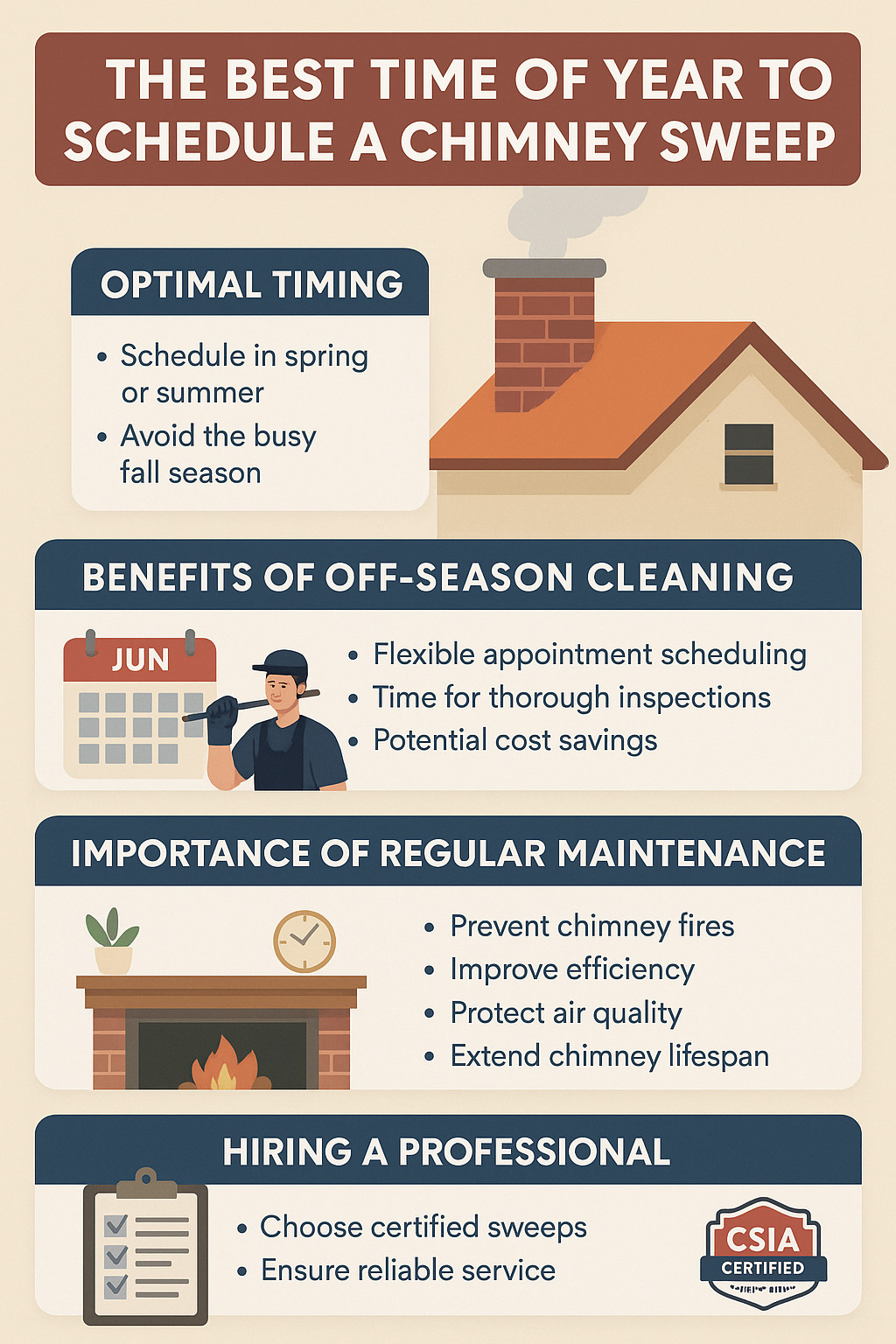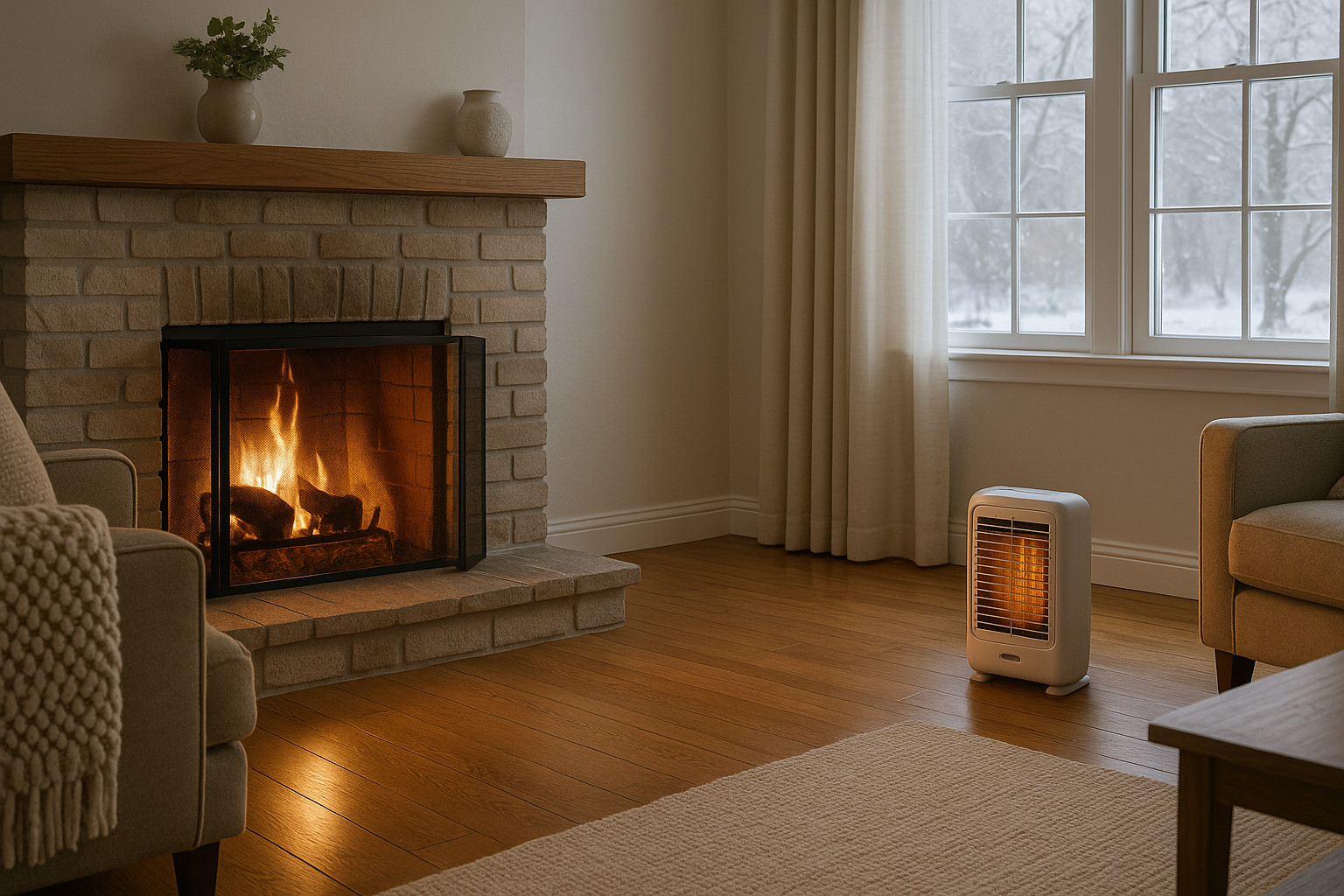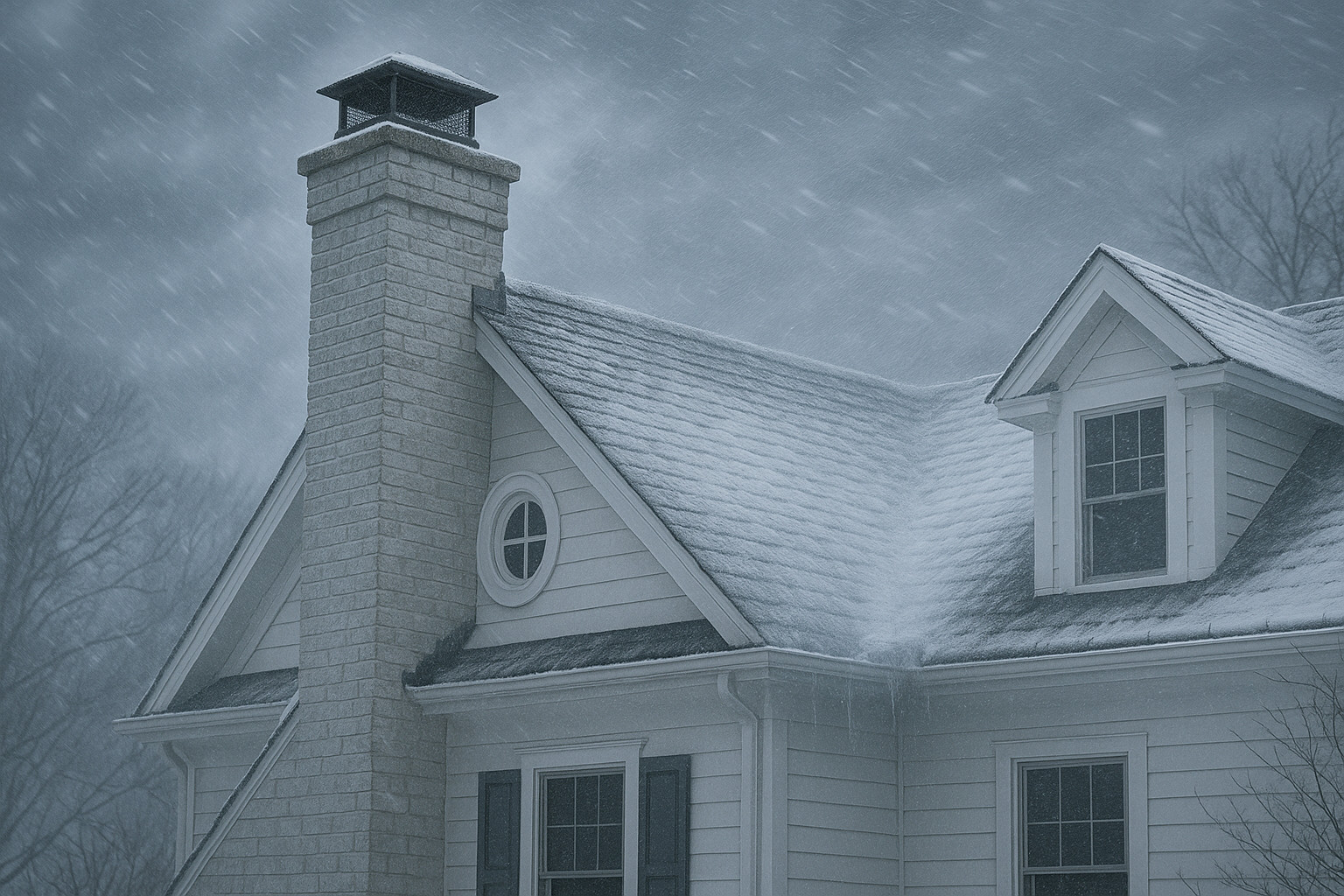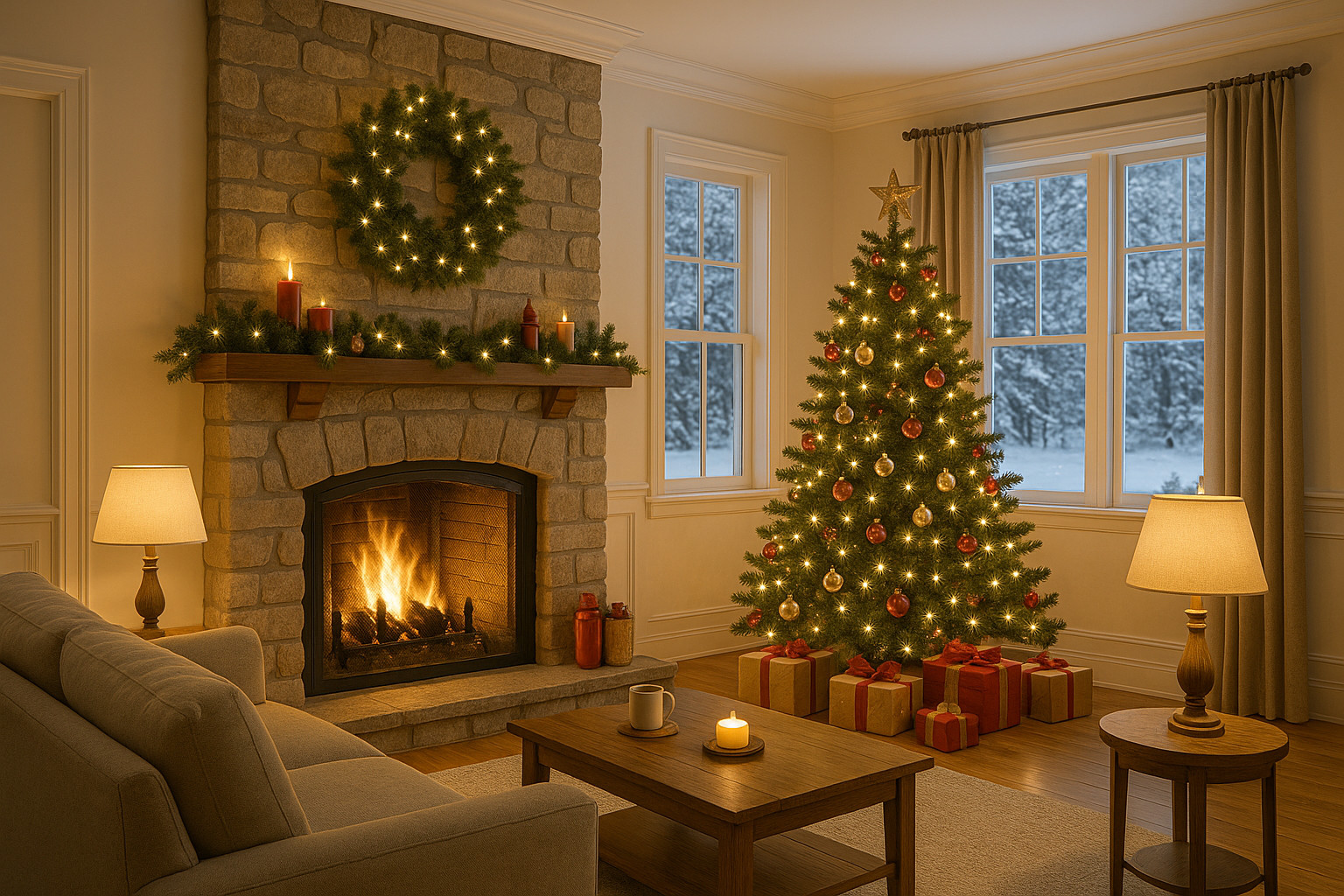The Best Time of Year to Schedule a Chimney Sweep in Brookfield, CT
Chimney maintenance isn’t just a winter task—timing matters. For Brookfield homeowners, knowing when to schedule your chimney sweep can mean safer fires, fewer repairs, and better energy efficiency all year long.
Share:
Table of Contents
If you rely on your fireplace to keep your Brookfield, CT home cozy and warm, chimney maintenance should be at the top of your seasonal checklist. Knowing the best time of year to schedule a chimney sweep can make all the difference in safety, performance, and even cost. In this guide, we’ll cover everything you need to know about chimney sweeping—when to do it, why it matters, and how to keep your chimney system running at peak efficiency year-round.
When Should You Schedule Your Chimney Sweep?
Timing is everything when it comes to chimney care. The National Fire Protection Association recommends at least one chimney inspection per year—and if you use your fireplace or wood stove regularly, a sweep is just as important. In Brookfield, CT, seasonal shifts affect when and how your chimney should be maintained. Scheduling your chimney sweep at the right time helps prevent dangerous creosote buildup, ensures your system is running efficiently, and gives you a better chance of catching issues before they become costly repairs.
Importance of Regular Chimney Maintenance
Keeping your chimney clean isn’t just about aesthetics. It’s about fire safety, energy efficiency, and extending the life of your fireplace or heating appliance. Routine chimney cleanings help prevent chimney fires caused by creosote buildup, reduce carbon monoxide risks, and ensure your system complies with safety standards like those outlined in NFPA 211.
Prevention of Chimney Fires
Creosote—a black, tar-like residue—builds up in chimneys over time and is highly flammable. Without regular sweeping, even a small spark can ignite this material, leading to a dangerous chimney fire. Annual cleanings dramatically reduce this risk and are especially crucial for homes using wood-burning stoves or gas fireplaces frequently.
Improving Appliance Efficiency
When soot, creosote, or debris obstructs the flue liner, your fireplace or heating appliance works harder to heat your home. That can lead to increased utility bills and lower heating efficiency. A clean chimney helps your system burn fuel more effectively, improving air quality and comfort in your home.
Protecting Indoor Air Quality
Blockages in the chimney system can trap smoke and carbon monoxide indoors, posing serious health hazards. Chimney inspections help identify issues like obstructions or water damage early, so your system continues to vent properly and safely.

Extending Chimney Lifespan
Routine maintenance, including chimney sweeping and chimney cap inspections, helps prevent long-term damage to the masonry, flashing, and chimney crown. Addressing small issues early—like a cracked flue liner or damaged mortar—extends the lifespan of your chimney and avoids expensive chimney repair down the line.
Optimal Timing for Chimney Sweeping
Why Spring or Summer Is Ideal
The best time to schedule your chimney sweep in Brookfield, CT is during the off-season—spring or summer. These months offer several advantages:
- Flexible scheduling: Fewer people are booking appointments, so you’re more likely to secure a convenient date.
- Advance prep: Cleaning your chimney well before cold weather hits ensures it’s ready when you need it.
- Easier detection: Warmer weather makes it easier for professionals to inspect crowns, flashing, and masonry for water damage or other structural issues.
Reasons to Avoid the Autumn Rush
Fall is typically the busiest season for chimney sweep services. Homeowners often wait until the last minute to prepare for winter, which leads to overbooked schedules and potential delays. Waiting too long might mean firing up your fireplace before it’s been properly cleaned or inspected—a risky move that could lead to carbon monoxide leaks or chimney fires.
Advantages of Summer Scheduling
During summer, your chimney sweep has the time and weather conditions to perform more thorough inspections. Issues like damaged chimney caps, crowns, or masonry can be repaired without the added challenge of snow, ice, or cold temps. Plus, you avoid peak pricing and emergency service fees.
Benefits of Early Fall Cleaning
If summer slips away from you, early fall is still a smart time to schedule your cleaning. You’ll beat the late-fall rush and still allow time for any necessary repairs before heavy fireplace use begins. Just make sure to book as early as possible to secure your spot.
Professional Chimney Services
Hiring a certified chimney sweep ensures your home receives expert care. At Certified Chimney, our team uses state-of-the-art chimney equipment including camera inspections and advanced tools to evaluate your chimney system inside and out. We also provide chimney relining, chimney flashing repair, dryer vent cleaning, and chimney cap & crown repair.
Comprehensive Chimney Inspections
Our chimney inspections go beyond just sweeping. We check for creosote buildup, structural damage, animal nests, and moisture penetration. These checks are vital for preventing hazards like smoking fireplaces or draft issues that affect air quality and safety.
Identifying and Addressing Potential Issues
From chimney relining to flue cap installation, identifying small issues early can prevent costly repairs later. Our team is trained to spot even subtle signs of chimney wear, including cracks, missing mortar, or rusting components.
Importance of Creosote Removal
Even if your chimney looks fine from the outside, dangerous creosote may be lurking inside. The Chimney Safety Institute of America (CSIA) recommends removing creosote when it reaches 1/8 of an inch in thickness. This level of buildup is common after a single season of heavy use.
Considerations for Hiring a Chimney Sweep
Selecting Qualified Professionals
Look for CSIA-certified technicians who follow strict safety protocols and use industry-approved techniques. Certification ensures your chimney sweep understands proper cleaning standards and fire prevention measures.
Verifying Certifications and Experience
A reputable sweep should be able to show credentials, insurance, and references. Ask about the tools they use, their cleaning process, and how they identify issues during inspections.
Understanding Service Costs
In Brookfield, CT, the cost of a chimney sweep typically ranges between $150 and $300, depending on the chimney system’s condition and the level of creosote buildup. While it may be tempting to go with the cheapest option, remember that quality and experience matter.
Maintaining a Safe and Efficient Fireplace
Your fireplace is one of your home’s most comforting features—but only when it’s safe. Routine chimney cleaning, annual inspections, and timely repairs ensure you can enjoy cozy fires without worrying about fire hazards, water damage, or carbon monoxide leaks.
To schedule your chimney sweep or inspection in Brookfield, CT, contact the trusted experts at Certified Chimney. We’ll help you prepare for winter early and stay safe all season long.
For more information on chimney safety, visit CSIA.org or NFPA.org.
Article details:
- Published by:
- Certified Chimney CT
- Published to:
- Last modified:
- July 27, 2025
Share:
Continue learning:



